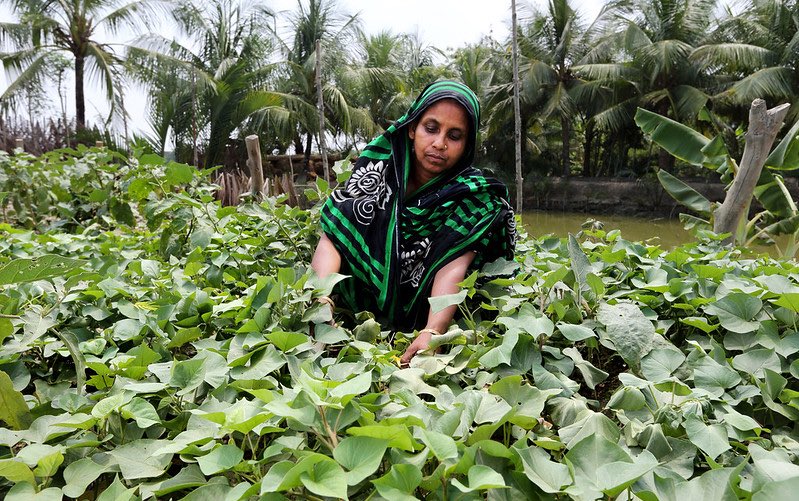Bangladesh’s location on the Bay of Bengal, its low-lying coastal delta topography, and its intensive rice monoculture make it one of the most vulnerable countries worldwide to climate threats, including floods, sea level rise, and salinization. Climate adaptation strategies in the agricultural and food production sectors will be critical to reduce the negative impacts of these climate-related changes, including the rising risk of food insecurity.
One useful approach is crop diversification, which provides alternative means of income and reduces the risk of total crop failure. Crop diversification also helps to increase dietary diversity and reduce micronutrient deficiencies, and has positive ecological impacts. Yet the strategy is not commonly used in Bangladesh, where many farmers practice intensive rice monoculture.
Studies have found that women’s empowerment can have positive impacts on livelihoods, including the adoption of alternative agricultural practices and improved nutrition and education outcomes. Can it also help improve crop diversity?
We sought to answer this question, investigating whether women’s empowerment influences the allocation of farmland to the production of different crop types, leading to a more diversified portfolio of crops. The results, recently published in Climatic Change, indicate that some aspects of women’s empowerment can indeed lead to more diversified crop production.
Using the Women’s Empowerment in Agriculture Index (WEAI), we ran series of alternative econometric models built to explore the relationships between indicators of women’s empowerment and crop diversification on surveyed farms in rural Bangladesh.
The models employed both the aggregated WEAI and three of its components: Women’s ownership of assets, participation in an economic or social group in their community, and input into making agricultural decisions. Crop diversification was measured across broad food categories, such as cereals, vegetables, and fruits. We were particularly interested in diversification that includes vegetables and fruits, which are fundamental to good nutrition.
Data came from the 2015 country-wide Bangladesh Integrated Household Survey (BIHS), conducted under IFPRI’s supervision.
The results indicate a complex association between women’s empowerment and crop diversification. While the models that use the aggregated WEAI suggest that increasing empowerment does not lead to greater levels of crop diversification, two of the specific sub-components of the WEAI do. Greater participation by women in production decisions has a notably positive effect, resulting in a greater share of household land being allocated to vegetables. In other words, households choose a more diversified portfolio of crops when women have a greater say in production decisions. Participation in community groups also had a positive effect, likely due to women’s greater access to information outside of the household.
Women’s ownership of assets, on the other hand, seems to lead to a decrease in crop diversification: More farmland allocated to cereals and less to vegetables. While this finding must be corroborated, there is evidence that women in Bangladesh with greater wealth choose to limit their involvement in agriculture, thus enabling men, who likely prefer rice production, to have a greater say in production decisions. Conversely, poorer women are reported to be more willing to defy local norms and accept work outside the home, and might therefore choose to participate in and encourage more labor-intensive and diverse agricultural activities, such as production of vegetables, pulses, and cash crops.
These findings show that a deeper understanding of the mechanisms underlying women’s choices and gender relationships is essential to efforts to encourage crop diversification—and to other climate and agricultural interventions. Climate adaptation strategies should make more concerted efforts to incorporate the multi-dimensional nature of women’s empowerment, as this research shows the important role of women’s decision-making in strengthening agricultural resilience to climate change.
Elizabeth Bryan is a Senior Scientist with IFPRI’s Environment and Production Technology Division (EPTD); Alessandro (Alex) De Pinto is a Professor of Climate Change and Food Security at the University of Greenwich Natural Resources Institute; Greg Seymour is an EPTD Research Fellow; Prapti Bhandary is a former Flagship Manager at the IFPRI-led CGIAR Research Program on Policies, Institutions, and Markets (PIM); Francesca Edralin is a former IFPRI Communications Intern.
This work was undertaken as part of the Gender, Climate Change and Nutrition Integration Initiative (GCAN) funded by USAID and associated with the CGIAR Research Program on Climate Change, Agriculture and Food Security (CCAFS).







